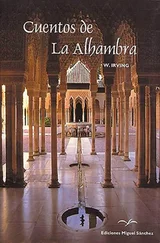Washington Irving - The Alhambra
Здесь есть возможность читать онлайн «Washington Irving - The Alhambra» — ознакомительный отрывок электронной книги совершенно бесплатно, а после прочтения отрывка купить полную версию. В некоторых случаях можно слушать аудио, скачать через торрент в формате fb2 и присутствует краткое содержание. Жанр: unrecognised, на английском языке. Описание произведения, (предисловие) а так же отзывы посетителей доступны на портале библиотеки ЛибКат.
- Название:The Alhambra
- Автор:
- Жанр:
- Год:неизвестен
- ISBN:нет данных
- Рейтинг книги:5 / 5. Голосов: 1
-
Избранное:Добавить в избранное
- Отзывы:
-
Ваша оценка:
- 100
- 1
- 2
- 3
- 4
- 5
The Alhambra: краткое содержание, описание и аннотация
Предлагаем к чтению аннотацию, описание, краткое содержание или предисловие (зависит от того, что написал сам автор книги «The Alhambra»). Если вы не нашли необходимую информацию о книге — напишите в комментариях, мы постараемся отыскать её.
The Alhambra — читать онлайн ознакомительный отрывок
Ниже представлен текст книги, разбитый по страницам. Система сохранения места последней прочитанной страницы, позволяет с удобством читать онлайн бесплатно книгу «The Alhambra», без необходимости каждый раз заново искать на чём Вы остановились. Поставьте закладку, и сможете в любой момент перейти на страницу, на которой закончили чтение.
Интервал:
Закладка:
“Good! Santa Maria! the best in Granada. Salones grandes—camas de luxo—colchones de pluma (grand saloons—luxurious sleeping-rooms—beds of down). Ah, Señores, you will fare like King Chico in the Alhambra.”
“And how will my horses fare?” cried Sancho.
“Like King Chico’s horses. Chocolate con leche y bollos para almuerza ” (chocolate and milk with sugar cakes for breakfast), giving the squire a knowing wink and a leer.
After such satisfactory accounts, nothing more was to be desired on that head. So we rode quietly on, the squab little notary taking the lead, and turning to us every moment with some fresh exclamation about the grandeurs of Granada and the famous times we were to have at the posada.
Thus escorted, we passed between hedges of aloes and Indian figs, and through that wilderness of gardens with which the Vega is embroidered, and arrived about sunset at the gates of the city. Our officious little conductor conveyed us up one street and down another, until he rode into the court-yard of an inn where he appeared to be perfectly at home. Summoning the landlord by his Christian name, he committed us to his care as two cavalleros de mucho valor, worthy of his best apartments and most sumptuous fare. We were instantly reminded of the patronizing stranger who introduced Gil Blas with such a flourish of trumpets to the host and hostess of the inn at Pennaflor, ordering trouts for his supper and eating voraciously at his expense. “You know not what you possess,” cried he to the innkeeper and his wife. “You have a treasure in your house. Behold in this young gentleman the eighth wonder of the world—nothing in this house is too good for Señor Gil Blas of Santillane, who deserves to be entertained like a prince.”
Determined that the little notary should not eat trouts at our expense, like his prototype of Pennaflor, we forbore to ask him to supper; nor had we reason to reproach ourselves with ingratitude, for we found before morning the little varlet, who was no doubt a good friend of the landlord, had decoyed us into one of the shabbiest posadas in Granada.
PALACE OF THE ALHAMBRA
TO the traveller imbued with a feeling for the historical and poetical, so inseparably intertwined in the annals of romantic Spain, the Alhambra is as much an object of devotion as is the Caaba to all true Moslems. How many legends and traditions, true and fabulous,—how many songs and ballads, Arabian and Spanish, of love and war and chivalry, are associated with this Oriental pile! It was the royal abode of the Moorish kings, where, surrounded with the splendors and refinements of Asiatic luxury, they held dominion over what they vaunted as a terrestrial paradise, and made their last stand for empire in Spain. The royal palace forms but a part of a fortress, the walls of which, studded with towers, stretch irregularly round the whole crest of a hill, a spur of the Sierra Nevada or Snowy Mountains, and overlook the city; externally it is a rude congregation of towers and battlements, with no regularity of plan nor grace of architecture, and giving little promise of the grace and beauty which prevail within.
In the time of the Moors the fortress was capable of containing within its outward precincts an army of forty thousand men, and served occasionally as a stronghold of the sovereigns against their rebellious subjects. After the kingdom had passed into the hands of the Christians, the Alhambra continued to be a royal demesne, and was occasionally inhabited by the Castilian monarchs. The emperor Charles V. commenced a sumptuous palace within its walls, but was deterred from completing it by repeated shocks of earthquakes. The last royal residents were Philip V. and his beautiful queen, Elizabetta of Parma, early in the eighteenth century. Great preparations were made for their reception. The palace and gardens were placed in a state of repair, and a new suite of apartments erected, and decorated by artists brought from Italy. The sojourn of the sovereigns was transient, and after their departure the palace once more became desolate. Still the place was maintained with some military state. The governor held it immediately from the crown, its jurisdiction extended down into the suburbs of the city, and was independent of the captain-general of Granada. A considerable garrison was kept up; the governor had his apartments in the front of the old Moorish palace, and never descended into Granada without some military parade. The fortress, in fact, was a little town of itself, having several streets of houses within its walls, together with a Franciscan convent and a parochial church.
The desertion of the court, however, was a fatal blow to the Alhambra. Its beautiful halls became desolate, and some of them fell to ruin; the gardens were destroyed, and the fountains ceased to play. By degrees the dwellings became filled with a loose and lawless population; contrabandistas, who availed themselves of its independent jurisdiction to carry on a wide and daring course of smuggling, and thieves and rogues of all sorts, who made this their place of refuge whence they might depredate upon Granada and its vicinity. The strong arm of government at length interfered; the whole community was thoroughly sifted; none were suffered to remain but such as were of honest character, and had legitimate right to a residence; the greater part of the houses were demolished and a mere hamlet left, with the parochial church and the Franciscan convent. During the recent troubles in Spain, when Granada was in the hands of the French, the Alhambra was garrisoned by their troops, and the palace was occasionally inhabited by the French commander. With that enlightened taste which has ever distinguished the French nation in their conquests, this monument of Moorish elegance and grandeur was rescued from the absolute ruin and desolation that were overwhelming it. The roofs were repaired, the saloons and galleries protected from the weather, the gardens cultivated, the watercourses restored, the fountains once more made to throw up their sparkling showers; and Spain may thank her invaders for having preserved to her the most beautiful and interesting of her historical monuments.
On the departure of the French they blew up several towers of the outer wall, and left the fortifications scarcely tenable. Since that time the military importance of the post is at an end. The garrison is a handful of invalid soldiers, whose principal duty is to guard some of the outer towers, which serve occasionally as a prison of state; and the governor, abandoning the lofty hill of the Alhambra, resides in the centre of Granada, for the more convenient dispatch of his official duties. I cannot conclude this brief notice of the state of the fortress without bearing testimony to the honorable exertions of its present commander, Don Francisco de Serna, who is tasking all the limited resources at his command to put the palace in a state of repair, and by his judicious precautions has for some time arrested its too certain decay. Had his predecessors discharged the duties of their station with equal fidelity, the Alhambra might yet have remained in almost its pristine beauty; were government to second him with means equal to his zeal, this relic of it might still be preserved for many generations to adorn the land, and attract the curious and enlightened of every clime.
Our first object of course, on the morning after our arrival, was a visit to this time-honored edifice; it has been so often, however, and so minutely described by travellers, that I shall not undertake to give a comprehensive and elaborate account of it, but merely occasional sketches of parts, with the incidents and associations connected with them.
Leaving our posada, and traversing the renowned square of the Vivarrambla, once the scene of Moorish jousts and tournaments, now a crowded market-place, we proceeded along the Zacatin, the main street of what, in the time of the Moors, was the Great Bazaar, and where small shops and narrow alleys still retain the Oriental character. Crossing an open place in front of the palace of the captain-general, we ascended a confined and winding street, the name of which reminded us of the chivalric days of Granada. It is called the Calle, or street of the Gomeres, from a Moorish family famous in chronicle and song. This street led up to the Puerta de las Granadas, a massive gateway of Grecian architecture, built by Charles V., forming the entrance to the domains of the Alhambra.
Читать дальшеИнтервал:
Закладка:
Похожие книги на «The Alhambra»
Представляем Вашему вниманию похожие книги на «The Alhambra» списком для выбора. Мы отобрали схожую по названию и смыслу литературу в надежде предоставить читателям больше вариантов отыскать новые, интересные, ещё непрочитанные произведения.
Обсуждение, отзывы о книге «The Alhambra» и просто собственные мнения читателей. Оставьте ваши комментарии, напишите, что Вы думаете о произведении, его смысле или главных героях. Укажите что конкретно понравилось, а что нет, и почему Вы так считаете.












